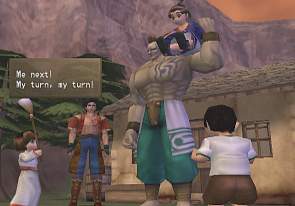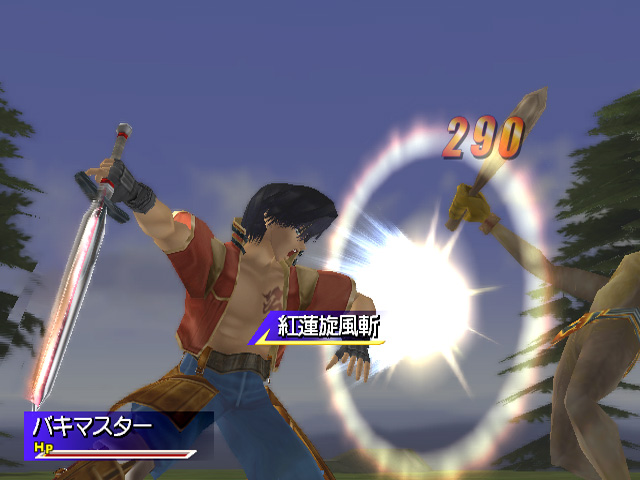 |
Legaia 2: Dual Saga - Review |
 |
Arisen from Mediocrity
By: Paul Koehler
| Review Breakdown |
| Battle System |
6 |
| Interface |
9 |
| Music/Sound |
6 |
| Originality |
5 |
| Plot |
6 |
| Localization |
7 |
| Replay Value |
6 |
| Visuals |
9 |
| Difficulty |
Average |
| Time to Complete |
45-55 hours
|
|
| Overall |
 |
| Criteria
|

|
| |
Slightly before the release of Final Fantasy VIII, Sony brought over a new RPG for North American audiences: Legend of Legaia. The game's standout feature was its battle system. While turn-based, it allowed special attacks that were inputted by using the directional-pad. If the right combination of attacks was found, characters would discover an "Art", or special combo attack that could be used against enemies. Legend of Legaia received mediocre reviews on its release, as it was a game that was overshadowed by many superior titles at the time. Nevertheless, its sequel on the PlayStation 2, LeGaia: Dual Saga now stands as one of the more solid titles for the system. With a more robust battle system, more detailed interface, and a fully-developed 3D world, the game has brought the Legend of Legaia series out of mediocrity and made it one of the best console RPGs for the fall.
Like its predecessor, the game's most unique feature is its battle system. Replacing the Serus of the first game is the "Tactial Art System", or TAS, which works on the same premise as the original. Characters input attacks by using the up, down, right, or left arrows. Each character has a certain number of "Art Blocks" with which they can input these commands, and certain combinations of attacks create special "Arts". Normal Arts are powerful attacks that help charge the character's AP (or Art Points). Super Arts are even more powerful, but they drain AP instead of recharging it like Normal Arts.
Finally, there are the Hyper, Mystic, and Variable Arts. Hyper Arts are learned only in plot events throughout the game or by using specific items like scrolls. Mystic Arts can only be used with a strict set of conditions and involve the character's "Origin" (or spirit), while Variable Arts take two characters who pair up to attack a single target, causing significant damage. The variety of methods of attack in the game make for some interesting battles, as some Variable Arts near the end of the game can cause upwards of 200,000 damage if executed correctly. On the negative side, monsters or characters cannot die until an entire combo is executed, adding unnecessary length to the battles.

|
| Your friendly neighborhood giant.
|
|
This is even more so due to the amount of battles that are needed to survive certain areas of the game. Fortunately, the game has a wealth of options in the status menu that allow for detailed character development. The way the game handles equipment is unique: each character has a fixed amount of weight that they can carry, and it is limited by the character's experience level. This often forces players to choose between carrying more advanced weapons or a wealth of accessories. These accessories have certain abilities attached to them, like Item Thief (which helps characters occasionally steal items from enemies in battle). Accessories can also be combined, providing an impressive amount of combinations.
On the world map and in certain parts of dungeons, the party may be able to set camp and combine accessories, items, or upgrade weapons and/or armor. Upgrades are done using materials that are either bought in towns or found in battles. The best equipment in the game can only be obtained by upgrading weapons and armor in this matter, as it provides RPGamers an incentive to thoroughly explore each dungeon so that they get the full array of materials needed to upgrade their weapons before wasting their money in the next town's shop.
Cooking also takes a prominent role, ingredients can be bought in towns, and based on certain plot events or items, each of the characters can learn a variety of recipes that can be served while in camp. These dishes either increase or decrease the party's stats for a short period of time, and are especially useful if used before a boss fight.
Even with such detailed features, the game follows a type of plot that has been used time and time again in console RPGs. The main character, Lang, was an orphan who was taken in by a remote wilderness village that raised him to be a member of the community. While training to be a guardsman for his village, a mysteriours eclipse threatens all life in the world. While not a particularly original plot, it works well because the rest of the elements of the game were executed so well, especially the graphics and the music.

|
| Lang dealing punishment to his foes |
|
Legaia 2: Dual Saga is a good example of what the PlayStation 2 is capable of when pushed correctly. The game is fully 3D, and all of the characters were well rendered with a large amount of polygons. While not on the same caliber of a game like Final Fantasy X, it is close. All of the character's facial expressions are easily visible as well, adding an element of realism to the game.
In addition, the game's music is superb, handled by veteran RPG composer Yasunori Mitsuda. While this soundtrack was not on the same caliber as some of his earlier efforts, many of the tracks are well done and are enjoyable to listen to throughout the game's large dungeon crawls (of which there are many). It is unfortunate that the game's sound effects are not up to the same standard: voice-acting in particular is pretty second-rate, especially when compared to some similar efforts in other RPGs for the console.
Overall, Legaia 2: Dual Saga is a solid title. Finishing the game can take anywhere from 45 to 55 hours, though various sidequests including a separate battle arena and several mini-games can push the time well over that amount. Though the game may drag on through several parts (especially the battles), the amount of effort put into the game's development has paid off, and what might have been written off as the sequel to a mediocre PlayStation game has now become one of the best titles for the PlayStation 2 this fall. For those who have never played the original (or those who could care less for it), Legaia 2: Dual Saga is worth a try.
|










